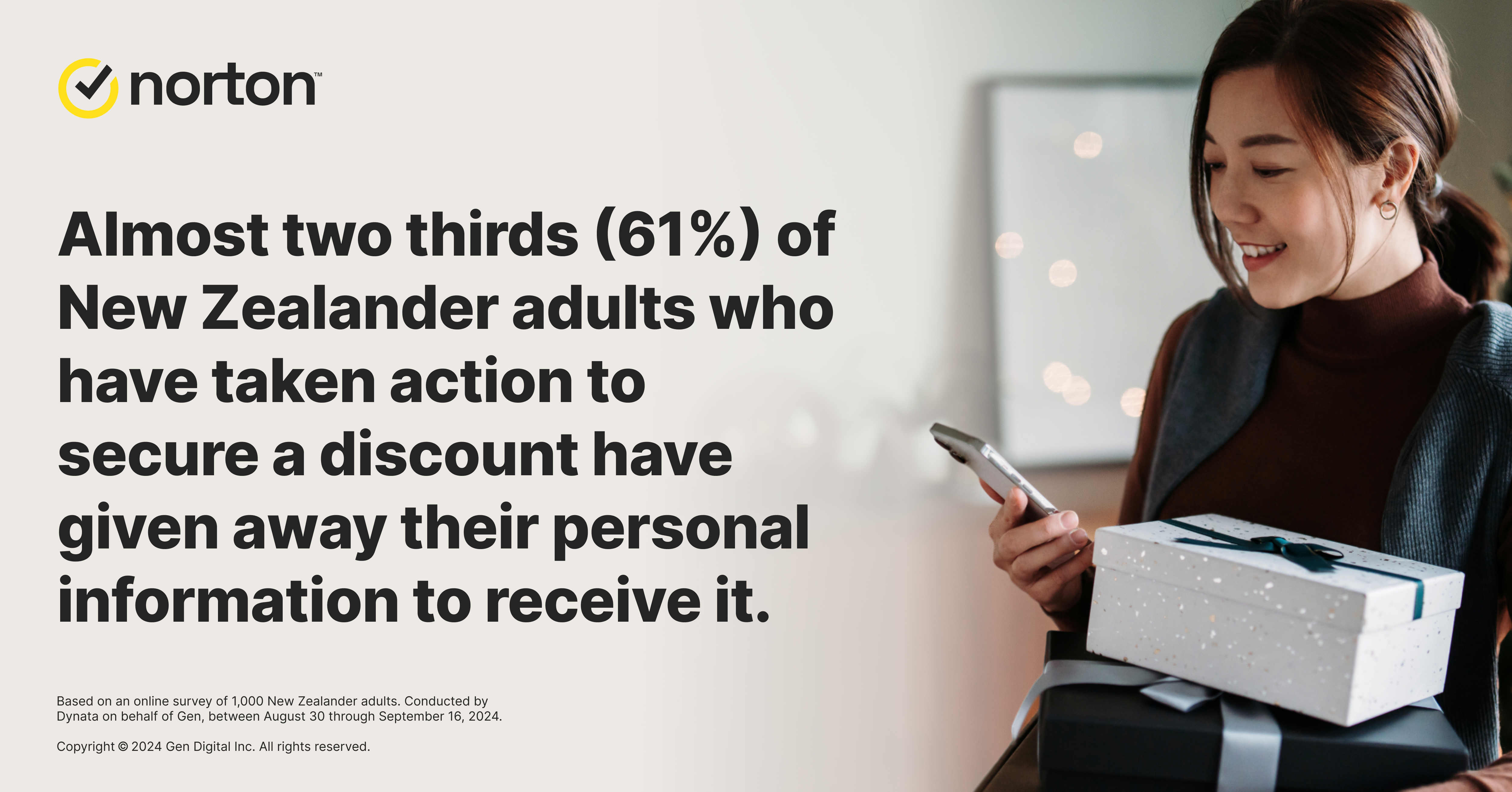
The pressure of financial struggles combined with the holiday rush is influencing Kiwi shoppers to weigh their need for discounts against their personal data security, often at the expense of their privacy, according to a global study by Norton, a consumer Cyber Safety brand of Gen™ (NASDAQ: GEN).
The increasing cost of living and the temptation of a bargain could be contributing Kiwis to take greater risks with their personal data as the holiday shopping season ramps up. New Zealanders are increasingly influenced by deals, with 81 percent of people actively seeking out the best offers during this time. Given that 94 percent of shoppers plan to make some purchases online, and a third (31 percent) plan to do the majority of their Christmas shopping online, this growing reliance on e-commerce comes at a cost.
Kiwis take risks to save money
As Kiwis continue to feel the pinch, 61 percent of New Zealand online shoppers have taken an action to secure a discount code. Actions range from signing up to a mailing list, posting on social media, to providing their phone number or home address. Alarmingly, this is despite 71 percent of New Zealanders being concerned about their personal details being compromised.
The financial pressure of rising living costs is tightening wallets, leading two-thirds (64 percent) of shoppers to take specific steps to cut holiday costs. Many Kiwis dedicate time to researching and comparing prices (32 percent), whilst others opt to buy resale or second-hand items (27 percent) and cut back on tech purchases (24 percent).
Many money-saving behaviours could make Kiwi consumers more vulnerable to potential scams. In fact, two in five New Zealanders are willing to give their phone and email for a discount of just 25 percent or less, exposing themselves to data risks in exchange for short-term savings.
“What’s particularly concerning is how the pressure to save money in a high-cost-of-living environment makes people more likely to engage with suspicious deals, despite their awareness of the risks. Their willingness to hand over personal data – phone numbers, email addresses, and other sensitive information – to secure deals and overlook potential red flags grows can leave them vulnerable, not only to losing personal data but also to significant financial losses,” says Mark Gorrie, Managing Director for Norton APAC.
Concerns about scams high
Amid an increasingly hostile online environment, concerns around scams and cybercrime remain understandably high, with 75 percent of Kiwis believing there are more scams during the holiday season than at other times of the year. Shoppers are not only worried about their own vulnerability but also for their loved ones, as 63 percent express concern that older family members might fall for scams via suspicious emails or text messages offering tempting sales.
This apprehension is justified, given that 25 percent of New Zealanders have been targeted by a scam during a previous holiday season. Among the various types of scams that Kiwis fell victim to, online shopping scams were the most prevalent (50 percent), followed closely by phishing (28 percent) and package delivery scams (26 percent).
The financial impacts of those scams are far from trivial. A whopping 83 per cent of those who were scammed reported financial losses, with the average amount lost reaching NZ$1,356. In extreme cases, reported losses were as high as NZ$50,000.
“The balance between seeking holiday savings and protecting personal data is becoming harder to maintain. In a time when scams are becoming increasingly sophisticated, especially with the surge of AI-driven scams and third-party retailers, Kiwis should remain cautious. Don’t let the temptation of a ‘too good to be true’ online offer lead to long-term financial pain,” says Gorrie.
“It's no coincidence that – while shoppers are keen for discounts – malvertising and adware are the cyber threats that increase the most dramatically during the holiday season. Global data from Gen shows an increase of over 53 percent in malvertising attacks, malicious ads often seen by users when searching for something such as sales, during last year’s holiday shopping season. Adware, malicious software often distributed via malvertising, increased by 227 percent over the same period.”
New Zealanders growing concerns about scams include the following:
Mark Gorrie shared his top tips on how to prepare for shopping events and defend against scams this holiday season:
To view the full results from the 2024 Norton Cyber Safety Insights Report: Holiday Shopping, visit HERE.
About the 2024 Norton Cyber Safety Insights Report: Special Release – Holiday shopping
The study was conducted online within New Zealand by Dynata on behalf of Gen from 30 August to 16 September 2024 among 1,000 adults ages 18 and older. Data are weighted where necessary by age, gender and region to be nationally representative.
###
About Norton
Norton is a leader in Cyber Safety, and part of Gen™ (NASDAQ: GEN), a global company dedicated to powering Digital Freedom with a family of trusted consumer brands. Norton empowers millions of individuals and families with award-winning protection for their devices, online privacy, and identity. Norton products and services are certified by independent testing organizations including AV-TEST, AV-Comparatives, and SE Labs. Norton is a founding member of the Coalition Against Stalkerware. Learn more at www.norton.com.
Disclaimer: This news release article is written by Rachael Joel at Botica Butler Raudon Partners.